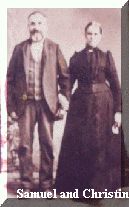|
The blizzard came from the west and struck
about 7am at the Grenz farm. It was fierce and the
temperature dropped 18 degrees in 3 minutes and kept dropping.
"Farmers who had spent a decade walking the same worn paths
became disoriented in seconds"
Sickness was no stranger on the prairie either. There
were severe diphtheria epidemics. One of Samuel's
cousins, Christoph Grenz was living not too far away on a farm
a few miles west of Eureka, just south of what is now Highway
10. On one visit to South Dakota, Arlo, mom and I found
a little graveyard surrounded by a barbed wire fence in the
middle of grassland on a homestead. To get to it, we had
to get off the highway and drive cautiously down a dirt road.
When we arrived, we saw a small, simple metal sign that says
West Grenz Cemetery. In the center of the cemetery
stands an obelisk shaped stone and on it are the names of 7
children of this one family. They all died from
diphtheria within the span of one month in the winter of 1897.
Only the two youngest children lived. The sorrow and
shock was great for the parents. That very next spring,
the family moved to North Dakota and they eventually ended up
in California.
For about a year, church meetings were held in private homes
with an occasional visit from a minister. On June 21,
1886, the First Baptist Church of Eureka was organized and
Samuel Grenz is listed among the approximately 30 charter
members. Reverend Berthold Matzke was the first pastor
and during his service from 1886-1888, 51 members were added
to the membership. By 1900, there were about 300
members. As more and more people gradually settled in
the area, it also made a more normal social life possible and
farmers no longer felt quite as isolated.
In the 1900 census, Samuel is found in Postal Township,
Campbell county, South Dakota living with his wife and with 4
children still at home. He owned his farm, but it was mortgaged.
The census indicates that the parents and the 3 older children
still at home, all sons, could all read and write. The
sons could speak English. The parents and the youngest
child, Lidia, could not speak English. Also Lidia, at
age 15, was not in school and could not read or write.
still at home. He owned his farm, but it was mortgaged.
The census indicates that the parents and the 3 older children
still at home, all sons, could all read and write. The
sons could speak English. The parents and the youngest
child, Lidia, could not speak English. Also Lidia, at
age 15, was not in school and could not read or write.
Hard to believe, but there is no indication that Samuel Grenz
ever made it to North Dakota. It seems that the only
ones who came to North Dakota were 4 sons: Jakob Grenz
who married in North Dakota, but died in South Dakota;
Wilhelm Grenz who married in Napoleon, North Dakota but died
in Bismarck. According to the records, Fred moved to
North Dakota in about 1902. There is a Grenz district in
North Dakota named in honor of Fred's brother, Christian
Grenz, who was Logan County commissioner 1st district between
1915 and 1919.
Samuel retired from farming at the age of 65 and moved into
the town of Eureka in 1903. Then, well, family history
indicates that after 19 years, Samuel had enough of the cold,
wet, icy winters of South Dakota. Can you imagine, he
had endured and lived through many frigid Russian winters and
some equally frigid South Dakota winters, and he still didn't
like to wear gloves when he worked!!
Samuel heard that in California it was warm and there were
fruit trees. So, recognizing a good deal and being the
courageous adventurer that he was,
|